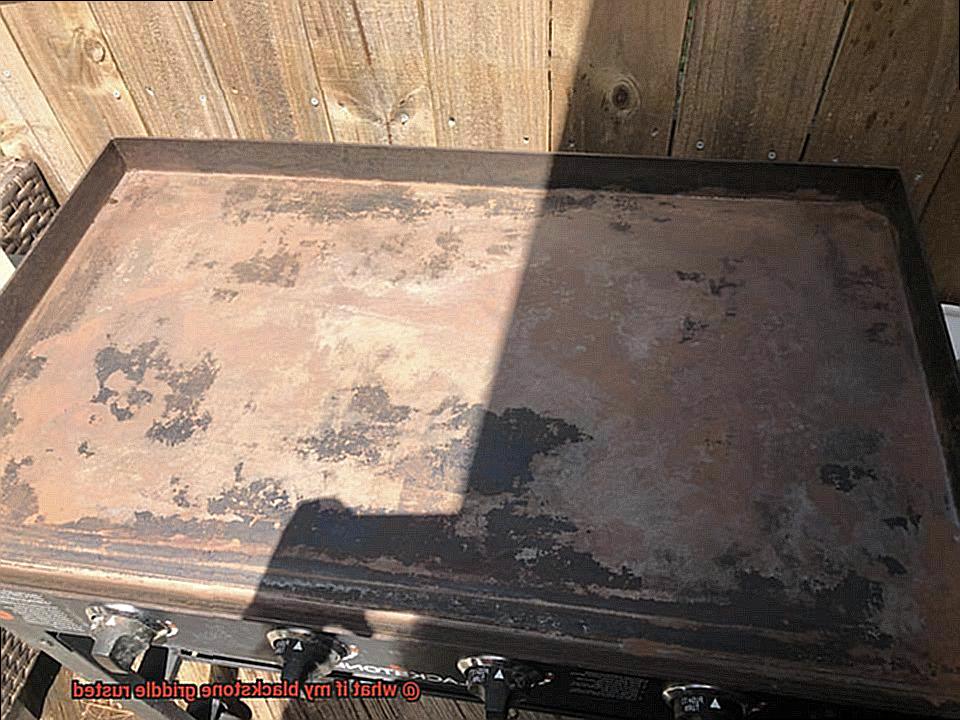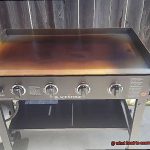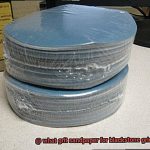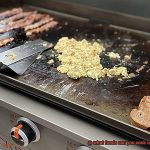Are you a proud owner of a blackstone griddle? The mouth-watering sizzle of bacon or the aroma of perfectly seared steak on a well-seasoned griddle is hard to beat. But what happens when your trusty appliance starts displaying signs of rust? Unfortunately, rust is a common problem for many blackstone griddle owners. Spending your weekends tackling rust can be frustrating, but don’t worry, it’s not the end of the world.
In this blog post, we’ll cover everything you need to know about what to do if your blackstone griddle has rusted. From why rust occurs to preventative measures, we’ve got you covered. We’ll also take a closer look at some effective ways to remove rust and prevent it from recurring, ensuring your griddle stays in tip-top shape for years to come.
But why is it so important to tackle rust on your grill? Aside from the obvious aesthetic issues, rust can cause serious health risks if flakes end up in your food. Additionally, it can weaken the overall structure of your griddle, causing it to function less efficiently.
So if you’re a blackstone griddle owner and want to keep your appliance rust-free and functioning properly, keep reading.
Contents
Causes of Rust on Blackstone Griddles
Unfortunately, rust formation can hinder this experience and even pose health hazards. But what causes rust on blackstone griddles? Let’s take a closer look.
Moisture is the most common culprit behind rust formation on blackstone griddles. Rain, humidity, and condensation from cooking create an ideal environment for rust to form. To prevent rust from forming due to moisture, make sure to dry your griddle after each use and store it in a dry place. Consider using a cover for your griddle if you live in a humid area to protect it from moisture.
Exposure to salt is another factor that can contribute to rust formation. Salt in the air near the ocean or from seasonings can cause the metal surface of your griddle to corrode and rust. To avoid this, clean your griddle thoroughly after each use and avoid leaving any residue on the surface.
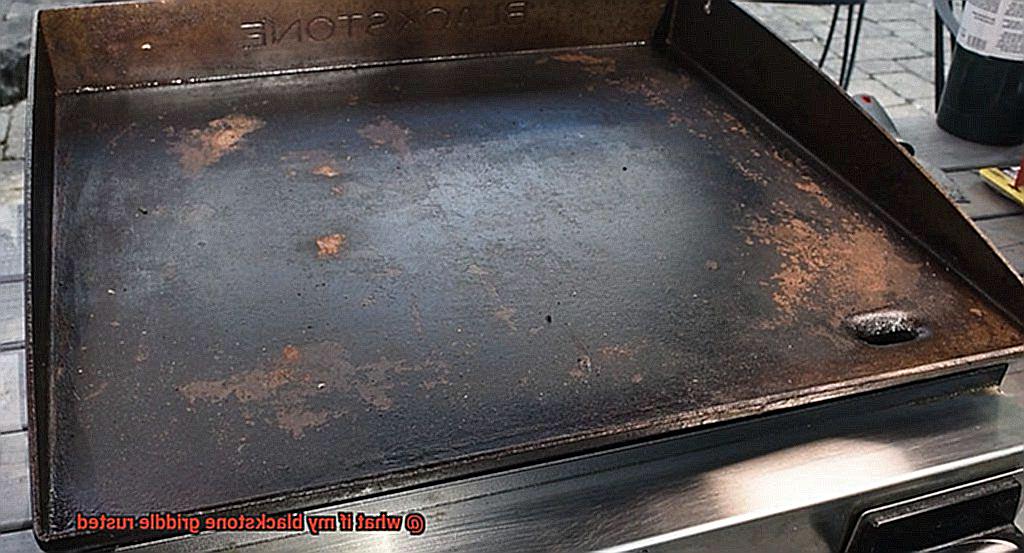
The material used in your griddle can also affect its susceptibility to rust. Blackstone griddles are typically made of steel or cast iron, both of which require regular maintenance to prevent corrosion. Steel is more prone to rust than cast iron, but both materials need proper care and attention.
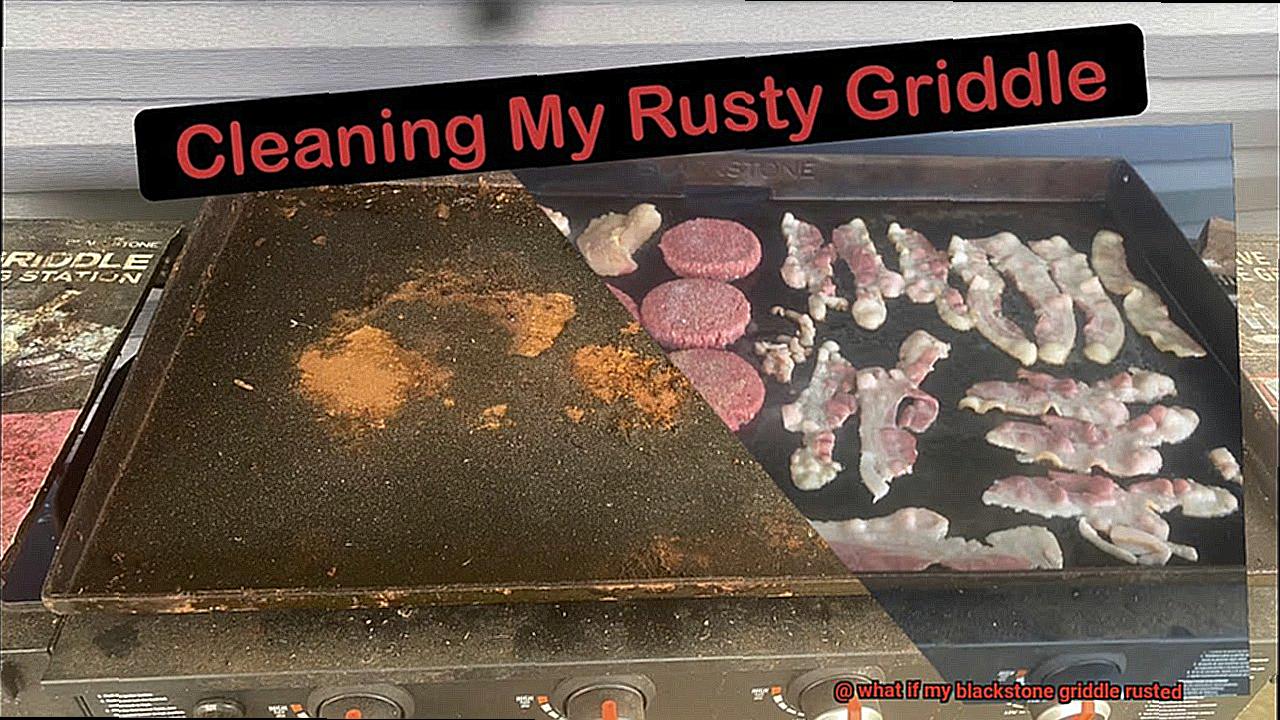
Improper storage and cleaning practices can also lead to rust formation on blackstone griddles. Leaving your griddle outside without a cover or storing it in a damp area increases the likelihood of rust formation. Similarly, using abrasive cleaners that scratch the surface or not cleaning the griddle after each use creates small openings for moisture and salt to penetrate and cause rust.
To prevent future rusting, always keep your blackstone griddle dry and clean. After each use, wipe it down with a dry cloth and store it in a dry place. If you live in a humid area or near the ocean, consider investing in a cover for your griddle to protect it from moisture and salt.
How to Identify Rust on Your Blackstone Griddle
Maintaining the quality of your Blackstone griddle is essential for a satisfying grilling experience, but rust can pose a significant threat to its longevity. Rust can form due to exposure to moisture, salt, and acidic substances, which can weaken the metal and cause it to deteriorate over time. To identify rust on your Blackstone griddle, you need to be vigilant and check for a few tell-tale signs.
Look for Discoloration
The first sign of rust on your Blackstone griddle is the appearance of brownish-red spots on the surface. These spots can be small or large, and they usually appear in areas where moisture has accumulated or where food has been left to sit for an extended period. The color of these spots is different from the rest of the surface and is often accompanied by a rough texture.
Check for Rough Texture
Another way to identify rust on your Blackstone griddle is by running your hand over the surface. Rust spots will feel rough and bumpy, unlike the smooth texture of an unblemished griddle. These rough spots are often accompanied by discoloration.
Use a Flashlight
Inspect hard-to-reach areas, such as inside the grease trap or around the burners, by using a flashlight. These areas are often neglected during cleaning and can harbor moisture and rust-causing agents.
Check for Pits or Holes
Rust can cause pits or holes to form on the griddle surface. These holes can compromise its cooking performance and make it challenging to clean. Look carefully for any signs of damage to the surface.
Be Proactive
Regularly inspecting your griddle for signs of rust is essential, but it’s even better to prevent rust from forming in the first place. Keep your Blackstone griddle dry and clean after each use, and consider investing in a cover if you live in a humid area. A little bit of prevention can go a long way in keeping your griddle rust-free and ready for use.
Removing Rust from Your Blackstone Griddle
Unfortunately, rust can develop due to exposure to moisture, heat, and other environmental factors. But don’t fret. Removing rust from your Blackstone griddle is a straightforward process that you can easily do at home.
Firstly, it’s essential to clean the griddle surface thoroughly before attempting to remove the rust. Use a scraper or spatula to get rid of any food debris or gunk from the griddle’s surface. Then, wipe down the griddle with a damp cloth to remove any remaining dirt or grease.
After cleaning the griddle, it’s time to tackle the rust. You have two options: purchase a commercial rust remover solution or make your own using equal parts vinegar and water. Apply the solution to the affected areas using a cloth or sponge and allow it to sit for a few minutes.
Once the rust remover has had time to work its magic, gently scrub the affected area with a wire brush or scouring pad. Be sure to use a gentle touch when scrubbing to avoid damaging your griddle’s surface.
When you’ve removed all of the rust, rinse the griddle thoroughly with water and dry it with a clean cloth. To prevent future rust formation, apply a thin layer of oil to the griddle’s surface.
In summary, removing rust from your Blackstone griddle is an easy process that can be done at home by following these simple steps:
- Clean the griddle surface thoroughly.
- Apply a commercial rust remover solution or create your own using vinegar and water.
- Allow the solution to sit for a few minutes.
- Gently scrub the affected area with a wire brush or scouring pad.
- Rinse the griddle thoroughly with water and dry it with a clean cloth.
- Apply a thin layer of oil to prevent future rust formation.
Preventing Future Rusting on Your Blackstone Griddle
But with great power comes great responsibility, and one crucial aspect of ensuring your griddle lasts for years to come is preventing rust formation.
Rust is the enemy of metal surfaces, and it occurs when the metal comes in contact with air and moisture, causing oxidation. Fortunately, there are several steps you can take to prevent rust from forming on your Blackstone griddle.
Firstly, cleanliness is key. After each use, remove any food debris and grease from the surface using a scraper or spatula. Then, wipe it down with a damp cloth or paper towel to remove any remaining residue. Once you’ve cleaned the griddle, make sure to dry it thoroughly with a dry cloth. Leaving moisture on the surface can lead to rust formation over time.
Secondly, consider giving your Blackstone griddle a protective coating to shield it against the elements. There are several types of coatings available that can help prevent rust from forming on the surface of the griddle. For example, you could use a food-grade oil like vegetable oil or flaxseed oil to create a protective barrier on the metal surface. Simply apply a thin layer of oil to the surface after cleaning and drying the griddle.
Thirdly, proper storage is essential in preventing rust formation. When not in use, store your Blackstone griddle in a dry place like a garage or shed to avoid exposure to moisture. You can also cover it with a weather-resistant cover for extra protection.
Lastly, consider upgrading to a stainless steel Blackstone griddle as they are highly resistant to rust and corrosion. Although stainless steel may be more expensive than other materials like cast iron or carbon steel, it’s worth considering if you’re looking for a durable and long-lasting option.
Tips for Maintaining Your Blackstone Griddle
Grilling on a Blackstone Griddle is a fantastic way to cook delicious meals, but it requires proper maintenance to prevent rusting and ensure it lasts long. Here are some practical tips and tricks to help you maintain your griddle and keep it in top condition.
Clean Your Griddle After Each Use
Cleaning your griddle after each use is crucial to preventing rusting. Use a scraper or spatula to remove any food debris or grease that may have accumulated on the surface. Once done, wipe the surface with a damp cloth and turn up the heat for a few minutes to dry it off. Keeping the surface clean and dry will prevent moisture from accumulating, which can lead to rusting.
Oil Your Griddle
Applying a light coat of vegetable oil or cooking spray before storing your griddle will protect the surface from moisture. Oil creates a barrier between the metal surface and any moisture, preventing rusting. It’s essential to use a light coat as too much oil can cause it to become sticky and attract dirt.
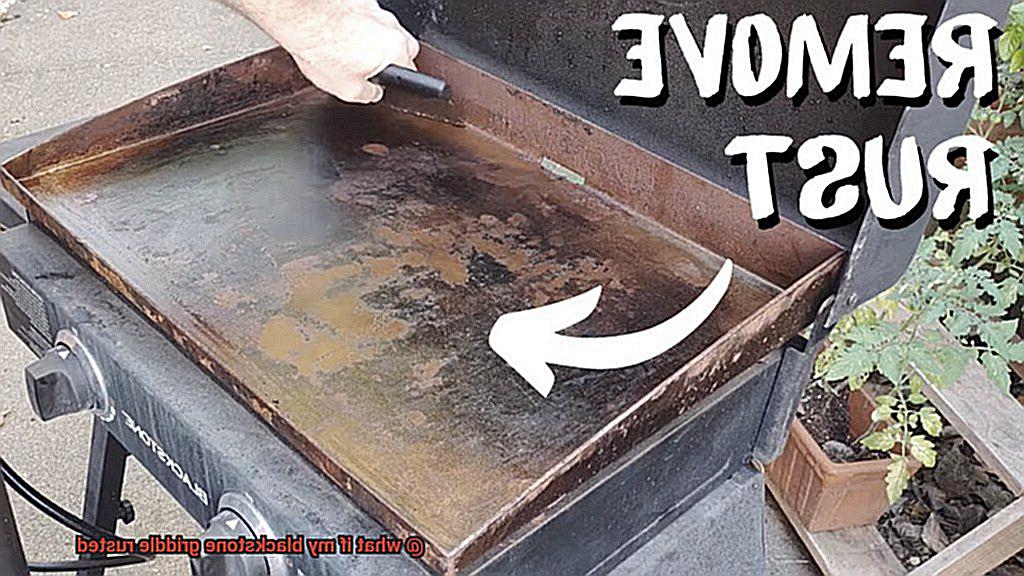
Use A Cover
Investing in a cover is an excellent way to protect your Blackstone griddle from the elements, especially if you store it outside. A good quality cover will keep moisture from getting in and prevent rust from forming. Alternatively, you can store your griddle indoors or in a dry place when not in use.
Store Your Griddle In A Dry Place
Moisture is one of the primary causes of rusting, so keeping your griddle dry is crucial to prevent rust from forming. If you’re not using your griddle regularly, store it in a dry place like a garage or shed. Avoid storing it in damp areas like a basement or near a pool.
Season Your Griddle
Seasoning your Blackstone griddle is an effective way of protecting it from rusting. To season your griddle, apply a thin layer of vegetable oil or flaxseed oil on the surface and heat it on high for about 20-30 minutes. Once done, wipe off any excess oil with a cloth or paper towel. Seasoning your griddle forms a protective layer that prevents rusting and makes it easier to clean.
The Benefits of Properly Maintaining Your Blackstone Griddle
The sizzle, the smell, and the taste of your favorite dishes all come together to create an unforgettable meal. But like any good thing, your griddle needs proper maintenance to keep it in tip-top shape. In this article, we’ll explore the many benefits of properly maintaining your Blackstone Griddle and how it can help you continue cooking up delicious meals for years to come.
First on the list of benefits is preventing rust from developing. Rust is a common problem that can lead to deterioration of the griddle and, in the worst cases, replacement. To avoid this outcome, it’s important to clean your griddle after every use with a scraper and cleaning solution. Additionally, using a protective cover when the griddle is not in use helps prevent moisture from building up on the surface, which can also cause rust.
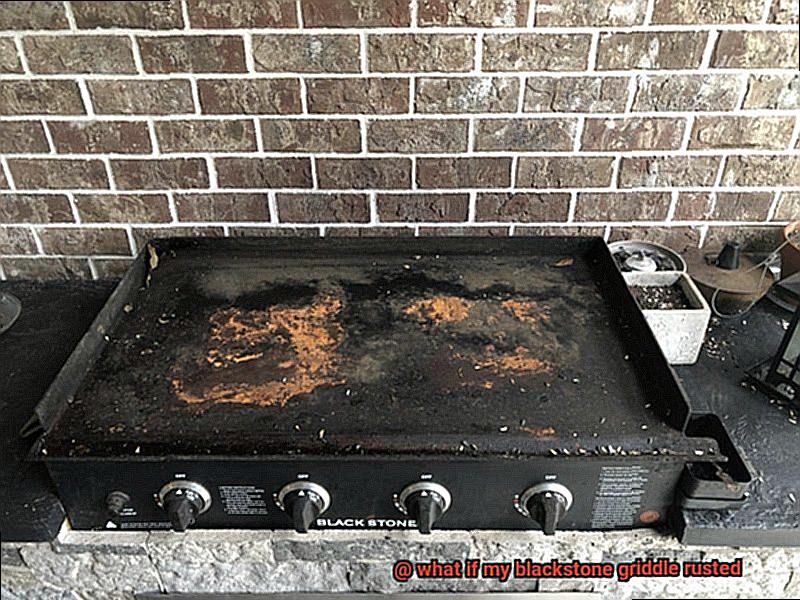
Another benefit of proper maintenance is keeping your griddle’s surface clean and free of debris. Food particles or grease that are left on the surface can also lead to rust if they’re not cleaned promptly. By cleaning your griddle after every use, you’ll keep it in pristine condition and free of debris.
Maintaining your griddle also helps preserve its non-stick surface. Over time, the non-stick coating on your griddle may wear down, making it difficult to cook without food sticking. However, with proper cleaning and seasoning, you can help maintain the non-stick surface and ensure that your meals cook evenly without sticking.
Lastly, proper maintenance ensures that your Blackstone Griddle remains safe to use. Rust can compromise the integrity of the griddle and potentially lead to safety hazards. Regular cleaning and maintenance prevent rust from developing, keeping your griddle safe for you and your loved ones to use.
Common Mistakes to Avoid When Cleaning and Maintaining Your Blackstone Griddle
But to make the most of your griddle and ensure it lasts for years to come, you need to avoid some common mistakes when cleaning and maintaining it.
Firstly, neglecting to clean your griddle properly after each use is a big mistake. Failing to clean off grease and food particles can lead to rust formation on the surface. To prevent this, use mild soap and warm water with a soft-bristled brush or scraper to keep your griddle clean after each use.
Secondly, using harsh chemicals or abrasive tools on your griddle can cause damage to the surface and make it more susceptible to rusting. It’s better to stick with mild soap and water rather than strong cleaning agents.
Thirdly, seasoning your Blackstone griddle after each use is essential. Seasoning creates an oil barrier that protects against moisture and rust formation. Simply apply a thin layer of oil – vegetable oil or flaxseed oil are good options – while the griddle is still warm.
Lastly, proper storage is crucial in maintaining your Blackstone griddle. Make sure it’s completely dry before storing it in a dry place away from moisture or humidity. Using a protective cover can also help prevent rust formation.
Alternatives to the Traditional Blackstone Griddle
As an expert in the field, I have researched and compiled a list of fantastic alternative griddles that will elevate your culinary game.
First on our list is the timeless classic, cast iron griddles. Cast iron is known for its durability, even heating, and heat retention capabilities. These versatile griddles are perfect for cooking dishes that require high temperatures and even heating, making them a favorite among chefs and home cooks alike.
Another excellent option is the sleek and modern stainless steel griddle. It offers easy cleaning, rust-resistant properties, and a polished appearance that can fit into any kitchen aesthetic.
If you’re an outdoor enthusiast, a propane griddle is the way to go. These lightweight and portable griddles are perfect for camping trips, picnics or tailgating parties where you want to cook up some delicious meals while enjoying nature.
For indoor cooking, electric griddles are a popular option. These versatile appliances are easy to use, offer even heating, and can be used in any weather condition.
Lastly, non-stick griddles are perfect for those who want to avoid rust altogether. They are coated with a non-stick surface that prevents food from sticking and makes cleaning up a breeze. However, it’s important to note that these coatings can wear off over time and might not be as durable as other materials.
thPE2IgnSiI” >
Conclusion
In conclusion, a Blackstone griddle is an essential tool for any cooking enthusiast. However, rust formation can be a common issue due to constant use and exposure to environmental factors such as moisture and salt. Rust not only affects the appearance of your griddle but also compromises its performance and poses health risks. But don’t fret, preventing rust formation and removing it from your griddle is simple with proper maintenance and care.
To keep your Blackstone griddle in top condition, it’s crucial to clean it regularly after each use, apply a protective coating, store it with a cover, and season it appropriately. These easy steps will help prevent rust formation and keep your griddle looking as good as new.
If you do notice rust on your Blackstone griddle, don’t panic. Removing it is easy with the right tools and techniques. Just remember to avoid common mistakes like using harsh chemicals or abrasive tools that can damage the surface.
If you’re looking for durable options that are resistant to rust, consider alternative griddles such as cast iron or stainless steel.

